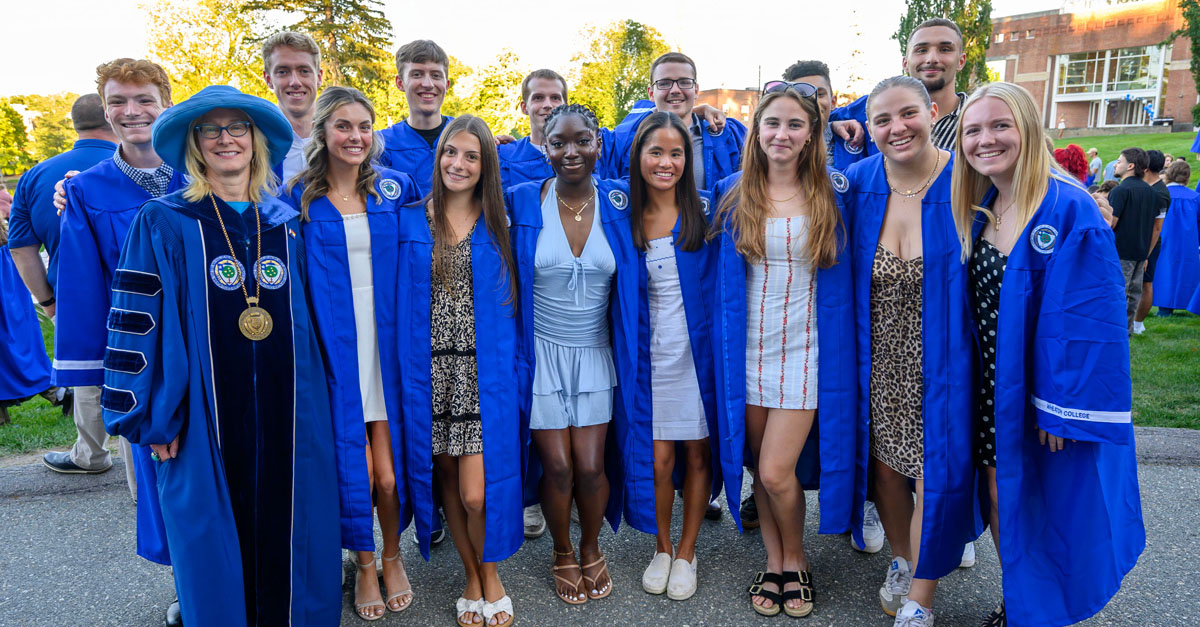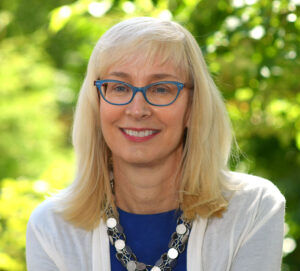Honoring tradition, embracing change

Wheaton marked the first day of classes with the traditional celebration of Opening Convocation attended by most of the college. The senior class donned the robes that they will wear at graduation and led the procession; faculty and first-year students followed.

All the speakers, including Student Government President Elizabeth McKinley ’26, addressed the theme for this year’s ceremony: empathy and storytelling. And our embedded mentoring ceremony exemplifies our values in that seniors pledge to guide and support first-years, and first-years pledge to seek support and ask questions. In this way, we presage their roles as alums who connect to each other and college while providing networking and guidance for students.
Amidst the tradition, however, there were new touches. With traditional and joyful bell ringing to mark the graduating class, the ceremony took place on Chapel Field, rather than in The Dimple where it has been held recently. (With so many participating and attending, the field provides more space and accessible pathways.) The academic robes worn by the Class of 2026 were Wheaton blue and sported the college logo, lending color and school spirit to the festivities.
That mix of tradition and innovation continues to be Wheaton’s hallmark. This academic year brings with it many new initiatives and improvements, all designed to enhance the college’s offerings for today’s students while retaining our commitment to rigor and excellence in arts and sciences.
For example, we returned to the tradition of reading a book for the incoming class, The Serviceberry by Robin Wall Limmerer, and all first-year students are participating in a semester-long workshop this fall on life and career planning. The workshop is part of a suite of new programs developed by the Life and Career Design Institute in collaboration with faculty. An overarching goal is to help new students develop the skills and habits of mind to take full advantage of their time at Wheaton and to prepare for their lives and careers. (You can read more about that in this issue.)
In athletics, men’s volleyball will take the court for the first time this winter–joining a longstanding women’s team. With men’s and women’s fencing and water polo, men’s volleyball is the fifth new varsity sport that the college has introduced in recent years. These additions provide new opportunities for students to pursue their competitive passions—and they are helping to grow Wheaton’s enrollment and geodiversity.
On a related front, the college renovated several vital athletic facilities during the summer, replacing the turf on Nordin Field and overseeing a long-overdue overhaul of the Balfour Natatorium pool and all of its utilities. The renovation of the pool will greatly improve the experience of the five varsity teams that now rely on the facility—artistic swimming, men’s and women’s swimming and diving, and men’s and women’s water polo, entering their second season of competition. Lore has it that Wheaton now joins Stanford as one of the few colleges offering a full aquatics program!
Building renovations touched a number of student residences this summer as well. The college continued its program of upgrading dorms and theme houses, which we began in 2022, replacing floorings and furnishings, repainting interiors and improving common spaces. We also completed major improvements to Chapin Hall, restoring the wooden floors and re-tiling the entryway that were essential to the character of the original building, enhancing student rooms and improving common areas throughout. Students tell me that the remodeled bathrooms are now the envy of the campus.
Ironically, the largest and most costly improvement will be largely invisible. The college fixed the old and inadequate storm drainage system running from Howard Street to Peacock Pond. Over the years, small and root-filled pipes caused flooding problems and limited the use of outdoor spaces and buildings around Hebe Court. Now with much larger pipes and a special filter system to keep the pond clean, the college can more fully use upper campus and plan to make the courtyard between Watson Fine Arts and Mars Arts and Humanities more inviting for visiting families and our community.
With multi-year capital planning and a new WheaInnovate Initiative, Wheaton is building on its dynamic history of tradition and transformation. Every day, Wheaton faculty, staff and students are partnering to update and evolve the college for the challenges of today and tomorrow. While not every change is visible, each one contributes to ensuring that the college can sustain the visionary tradition that matters most: providing a transformative liberal arts education in a collaborative and vibrant extended community and network that values and strives to create an equitable and just world.
